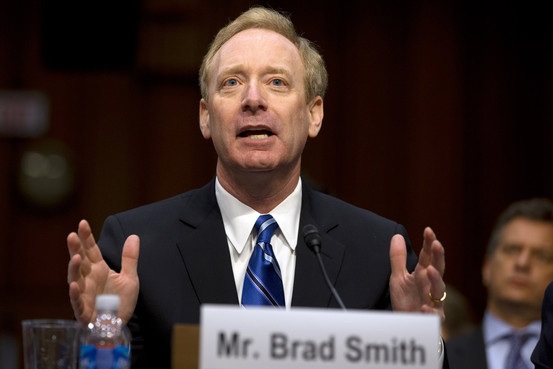Microsoft's post-Snowden offensive

Brad Smith, Microsoft's general counsel, has said tech companies have to make US spying harder. Image: Associated Press.
Microsoft Corp's top lawyer once made peace with the US government after an antitrust battle nearly broke the company apart. Now, it is Brad Smith who is picking the fight with Uncle Sam.
Smith is resisting US Department of Justice demands for emails from a Microsoft user's account in Europe. Last year, he tussled with the White House to reverse gag orders on government-issued data requests to tech companies. In a speech last month, Smith railed against the secret US surveillance court, saying its process was un-American.
US technology companies are battling to repair their reputations after leaks from former National Security Agency contractor Edward Snowden revealed their roles in US electronic surveillance programs. Smith, Microsoft's general counsel since 2002, has placed himself at the centre of the post-Snowden offensive.
"We made a conscious decision last year to focus more energy on this issue," Smith said. "You can look at everything we've said for a long time and they all relate to one thing: we believe consumers will only use technology if they trust it."
Snowden's disclosures helped spotlight how US tech and telecom companies, including Microsoft, for years co-operated with government-surveillance programs -- and in some cases, the government intercepted data without the companies' knowledge. Embarrassed by the revelations, some of those companies now are less willing to co-operate, and more vocal in criticising government snooping.
Facebook is resisting court-ordered search warrants in New York on nearly 400 user accounts, arguing the searches would be unconstitutional. Google chairman Eric Schmidt has labelled the NSA's mass siphoning of phone records as "bad public policy … and perhaps illegal". Cisco Systems chief executive John Chambers has complained to President Barack Obama about reports the NSA secretly planted bugs in the company's routers.
But the generally mild-mannered, 55-year-old Smith has emerged as the unlikely anti-snooping attack dog, both in court and in the court of public opinion.
A turning point, Smith said, were documents published in October from Snowden that showed US surveillance agencies tapped data flowing between tech companies' overseas computer centres, without the companies' knowledge. "That motivated us all to not just speak out, but speak out together," he said.
Microsoft's visibility in the offensive surprises some critics, who say Microsoft doesn't have a sterling record of defending computer users. Skeptics wonder if Smith's combativeness is a public relations campaign to placate customers, particularly foreign corporations and governments that have threatened to stop using US tech services.
"They have a pronounced interest to satisfy skeptical European customers," said Hanni Fakhoury, a staff attorney for data-privacy advocacy group the Electronic Frontier Foundation.
Smith said he understands skepticism about the company's motivations, but he said Microsoft's principles and its revenue are both at risk if people are wary of using its software.
"We do not take lightly filing a lawsuit against any government -- especially against our own government," he said. "That is an important decision that one takes only when you have this combination of principle and pragmatism at stake."
Microsoft, along with Google, sued the government last year to disclose how often the government issues national security-related data demands to companies. Last year Microsoft also challenged a secret request for data about a business customer from the Federal Bureau of Investigation.
Smith's biggest fight is with a federal prosecutor in New York who obtained a court order in December to compel Microsoft to hand over emails from a person connected to a drug-trafficking investigation. Smith says the emails are stored in a Microsoft computer centre in Ireland, and therefore the warrant isn't valid because it seeks to enforce US laws beyond the country's borders.
In court filings, prosecutors say Microsoft, as a US company, must comply with the country's laws no matter where it stores digital files. A spokesman for the US attorney's office in Manhattan declined to comment beyond its legal filings.
Smith said the Ireland case more than any other spotlights the risks to US businesses from the backlash against the NSA. He said a German executive approached him at a recent meeting with a copy of the court order, saying that he couldn't trust any US tech company unless the ruling is reversed.
The stakes are particularly high for Microsoft because it sells software to companies and governments around the world, including in countries such as Germany and Brazil where the NSA surveillance revelations were acutely felt particularly acutely. Germany in June said its government agencies would cancel a contract with Verizon Communications over concerns about network security, in the largest visible sign of the backlash against US spying disclosures. Verizon has said that its German arm had complied with German law.
Smith said it is now part of technology companies' job to make US spying harder. The company is opening "transparency centres" so government customers can scrutinise Microsoft's software for holes that could be exploited by spies. Like Google, Yahoo and others, Microsoft has started scrambling customer emails to protect them from prying eyes.
"We are definitely focused on making it harder for any government to access information without proper legal authority," Smith said.
Write to Shira Ovide at shira.ovide@wsj.com.
















